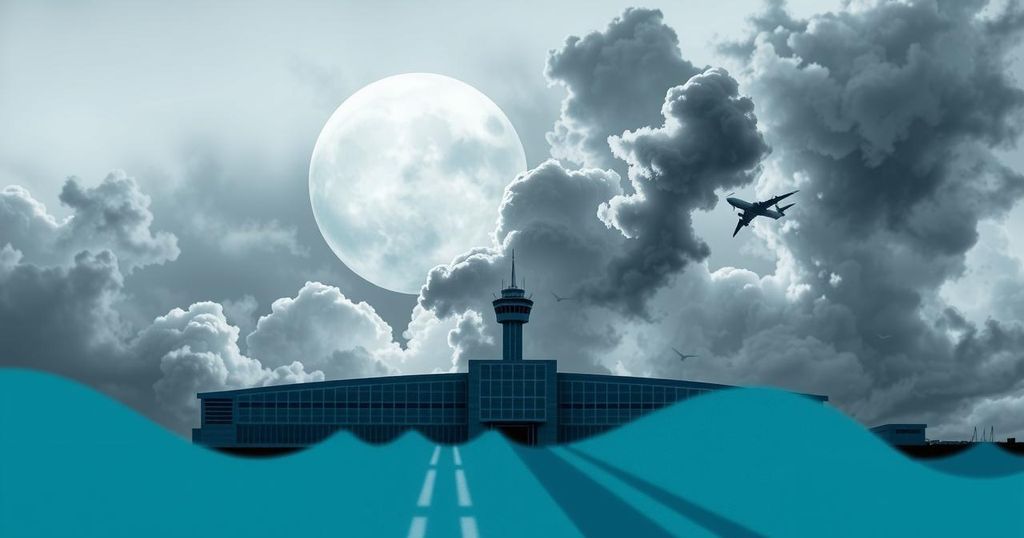An armed group backed by Rwandan troops has seized control of Goma’s airport following intense fighting, leading to significant casualties and injuries. The humanitarian situation has worsened with hospitals overwhelmed and civilians fleeing. Protests erupted against foreign embassies in Kinshasa, while the African Union urged the M23 to disarm. International concerns regarding Rwanda’s involvement and resource exploitation add complexity to the ongoing crisis in the DRC.
On Tuesday, an armed group backed by Rwandan forces captured the airport in Goma, a key city in the Democratic Republic of Congo (DRC), following three days of intense fighting that has resulted in over 100 fatalities and nearly 1,000 injuries. The escalating violence, particularly from the Tutsi-led M23 militia, has left Goma perilously close to being under their control, thereby significantly undermining the Congolese military’s defenses. Reportedly, over 1,200 Congolese soldiers have surrendered and are confined to a UN base at the airport.
The recent conflicts signify a dramatic escalation in the DRC’s continued struggles, deeply rooted in historical tensions dating back to the 1994 Rwandan genocide. Health facilities in Goma are overwhelmed, prompting a dire humanitarian crisis, with numerous wounded seeking care amid shortages, looting of aid, and disease outbreaks. With Goma now largely deserted post-conflict, fleeing residents spoke of immediate danger and chaos as they retreated to safety across the Rwandan border.
In Kinshasa, protests erupted against various embassies, condemning foreign involvement in the DRC’s affairs. Demonstrators focused their ire on embassies of Rwanda, France, Belgium, the United States, and others, with calls for withdrawal and support for Congo’s sovereignty. The United Nations has warned of potential ethnic clashes reminiscent of the past, while the International Committee of the Red Cross emphasized the urgent need for medical support and the threats posed by the possible spread of pathogens amid ongoing chaos.
The African Union urged the M23 to disarm, reflecting growing international concern regarding Rwanda’s involvement and the ongoing humanitarian repercussions of the conflict. Accusations have been made against Rwanda regarding resource exploitation, while the latter claims to be targeting the FDLR, an armed group formed by perpetrators of the 1994 genocide. With previous engagements of the M23 in Goma leading to temporary occupation, the current situation underscores the fragility of peace and stability in the eastern DRC.
An urgent crisis summit is set for Wednesday involving the Presidents of the DRC and Rwanda, serving as a critical moment in addressing the rising tensions. The resurgence of the M23, which had briefly occupied Goma a decade ago, reflects ongoing challenges in containing armed groups and maintaining stability in the region. The UN Security Council’s failure to explicitly address Rwanda’s role in the crisis has raised concerns regarding effective international response strategies.
The Democratic Republic of Congo has a long history of conflict, largely influenced by the aftermath of the 1994 Rwandan genocide and ongoing struggles for control over mineral-rich territories. The M23 group, with its roots in ethnic conflicts and external influence, has re-emerged as a significant threat, capturing territory and undermining the Congolese military. This backdrop has created a precarious humanitarian situation, leading to an influx of displaced persons and severe shortages of resources in Goma and the surrounding areas. The international community’s involvement, alongside regional dynamics, plays a crucial role in the ongoing crisis, complicating resolutions to the persistent violence.
In summary, the situation in Goma exemplifies the broader issues of conflict and humanitarian crises prevalent in the Democratic Republic of Congo. The capture of the airport by M23 forces, supported by Rwandan troops, is a poignant reminder of the region’s instability. The global response, particularly concerning the influence of foreign actors and the safety of civilians, is paramount in seeking a resolution. Heightened tensions in the region further complicate peace efforts and necessitate a unified international approach to restore stability.
Original Source: www.wfxg.com






